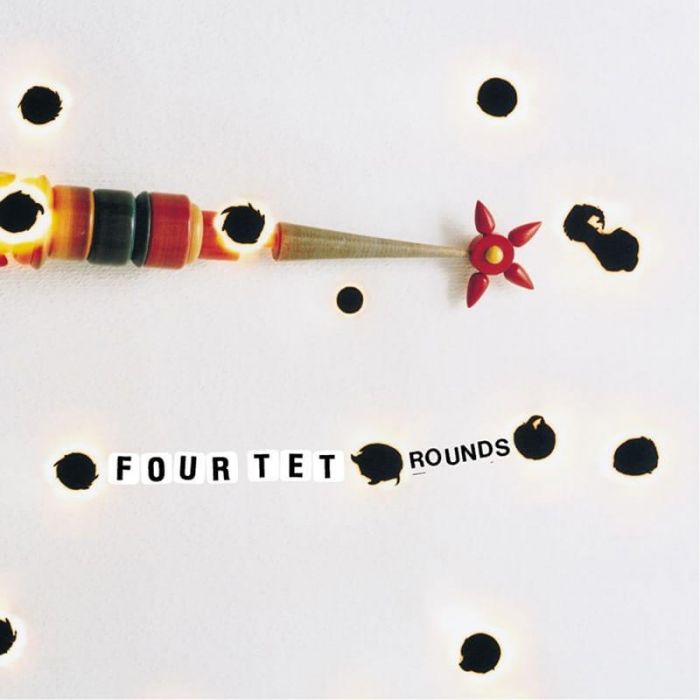Rounds by Four Tet (Review)

I can’t help but feel like a bit of a latecomer when talking about Four Tet. I’ve known of Kieran Hebden’s electronic project for some time, and have had several friends rave about him to me. But for some reason, I always put him off. Maybe it was because the first Four Tet song I ever heard was “No More Mosquitoes” (from 2001’s “Pause”) and there was just something about that kid’s incessant singing that turned me off. In my defense, I’ve since then warmed up to the album (and the song), but I still held Hebden’s music at arm’s length. I feel the need to get that off my chest, if only so that I can bask in Rounds’ beauty with a clean conscience. And as the saying goes, better late than never.
Hebden certainly wastes no time getting started, as he practically buries the listener under “Hands“ ‘ warm avalanche of glitchy, cut-up laptop fare. The song’s dense mass of sound practically floats and chirps, threatening to unravel into a thousand indistinct motes of sound at any moment. “She Moves She” takes shimmering chimes and bells and weaves in a vaguely Oriental zither-like melody, anchoring everything with a steady beat. Meanwhile, distorted shards of noise pop up at random, like a swarm of giant bees threatening to break into the song from somewhere outside. The song’s more delicate elements manage to keep them from taking over, but one wonders how long it will be until the song collapses into a buzzing, churning mess.
There is no such tension on the aptly titled “My Angel Rocks Back And Forth,” nor should there be. A beautiful, effortless piece, it’s delicately shifting tones sound as if they came from a harp strung with fine threads of glass and silver. “Angelic” is a fitting description, as the song exudes a feeling of peace and contentment. But whereas “My Angel Rocks Back And Forth” is a gently contemplative piece, “Spirit Fingers” is a flurry of activity. A shop full of fiddles, marimbas, dulcimers, and glockenspiels is suddenly caught up in a tornado… and Hebden just happens to be there with laptop and microphone in hand. The sounds never really coalesce into an actual song per se, but that’s fine. Although a simple rhythm knocks away, it’s pretty inconsequential, as Hebden obviously wants to overwhelm the listener with the seemingly endless iterations of sound fluttering through their ears.
“Unspoken” starts out as the album’s most grave and somber track. Over a booming beat that could’ve come from one of DJ Shadow’s more introspective tracks, Hebden lays a wounded piano melody. But Hebden refuses to let the track remain static. Giving himself plenty of time (the track clocks in at over 9 minutes), he brings in drifting guitar melodies, jittery trumpets, and plenty of the swarming tones and clicks you’ve come to expect by now.
Although the song’s core structure never changes (beneath the cacophony, you can still make out the original piano and beat), Hebden subtly changes the song’s mood with each new layer of sound he adds. When the piece finally reverts back to its original form, the once solemn piano melody contains a note of triumph and resolve, as if the childlike naïveté of Hebden’s sonic trickery somehow breathed in new life. On the other hand, “And They All Look Broken Hearted” never loses its melancholy aspect. As a drunken trap set staggers around in a nearby room, Hebden takes a haunting dulcimer melody and drizzles it with tiny rivulets of processed noises and fragments of sound.
While Hebden’s sonic layering can be bewildering, there’s a definite sense of exploration about it that never disappears. Like a little kid impatient to get down to the business of play, Hebden grabs the listener’s hand and pulls them along, eager to show them some new aural intricacy he’s discovered. The beauty and playfulness that exudes Rounds makes it clear that Hebden is probably more excited and inspired by his sounds than we can ever hope to be.